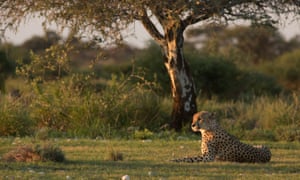Licences
for more than half of the Kgalagadi transfrontier park, one of Africa’s
largest conservation areas, have been granted to drill for shale gas

The Botswana
government has quietly sold the rights to frack for shale gas in one of
Africa’s largest protected conservation areas, it has emerged.
The Kgalagadi transfrontier park, which spans the border with South Africa, is an immense 3 6,000 sq km wilderness, home to gemsbok desert antelope, black-maned Kalahari lions and pygmy falcons. But conservationists and top park officials – who were not informed of the fracking rights sale – are now worried about the impact of drilling on wildlife.
Prospecting licences for more than half of the park were granted to a UK-listed company called Nodding Donkey in September 2014, although the sale has not been reported previously. That company changed its name earlier this month to Karoo Energy.
Park officials said that no drilling has yet taken place, but the Guardian found oil sediment on the ground near a popular camp site. There was an overwhelming smell of tar and a drill stem protruded from an apparently recently drilled hole. It is not known who had carried out the drilling or when.
Scientist Gus Mills worked and lived in Kgalagadi for 18 years studying cheetahs and hyenas. He said he is worried about the impact on wildlife and environment.
“The development that is going to have to go on there, with infrastructure that has to be moved in, seems to be yet another nail in the coffin of wild areas in the world.”
Dr Peter Apps, who studies large predators for the Botswana Predator Conservation Trust , said drilling could have a range of impacts, notably on water sources in the park.
The Kgalagadi transfrontier park, which spans the border with South Africa, is an immense 3 6,000 sq km wilderness, home to gemsbok desert antelope, black-maned Kalahari lions and pygmy falcons. But conservationists and top park officials – who were not informed of the fracking rights sale – are now worried about the impact of drilling on wildlife.
Prospecting licences for more than half of the park were granted to a UK-listed company called Nodding Donkey in September 2014, although the sale has not been reported previously. That company changed its name earlier this month to Karoo Energy.
Park officials said that no drilling has yet taken place, but the Guardian found oil sediment on the ground near a popular camp site. There was an overwhelming smell of tar and a drill stem protruded from an apparently recently drilled hole. It is not known who had carried out the drilling or when.
Scientist Gus Mills worked and lived in Kgalagadi for 18 years studying cheetahs and hyenas. He said he is worried about the impact on wildlife and environment.
“The development that is going to have to go on there, with infrastructure that has to be moved in, seems to be yet another nail in the coffin of wild areas in the world.”
Dr Peter Apps, who studies large predators for the Botswana Predator Conservation Trust , said drilling could have a range of impacts, notably on water sources in the park.
Read More Here

No comments:
Post a Comment
Hello and thank you for visiting my blog. Please share your thoughts and leave a comment :)